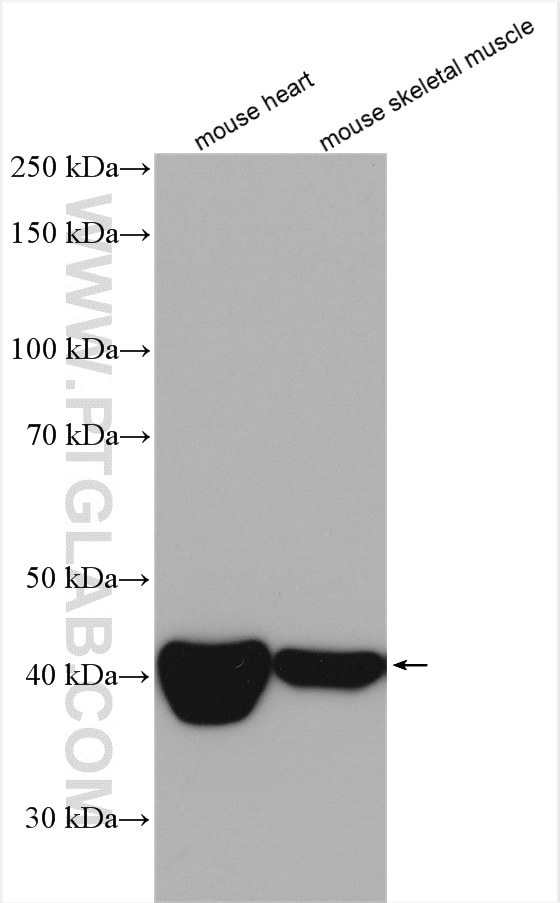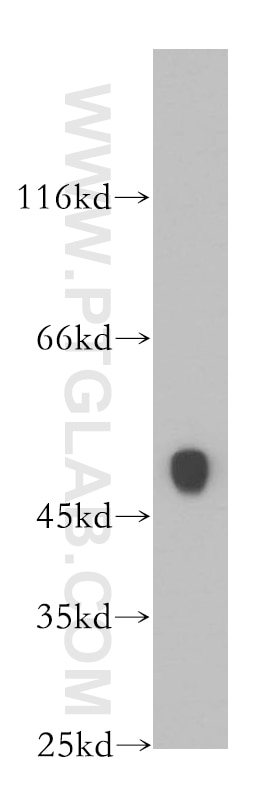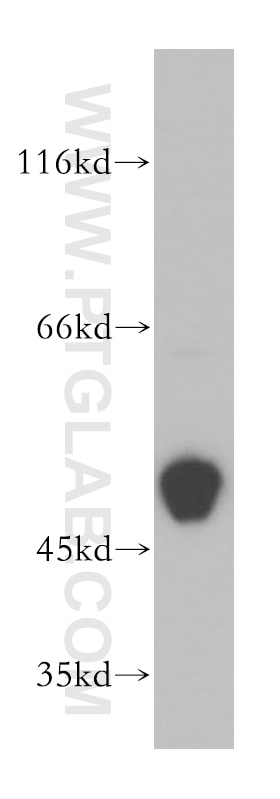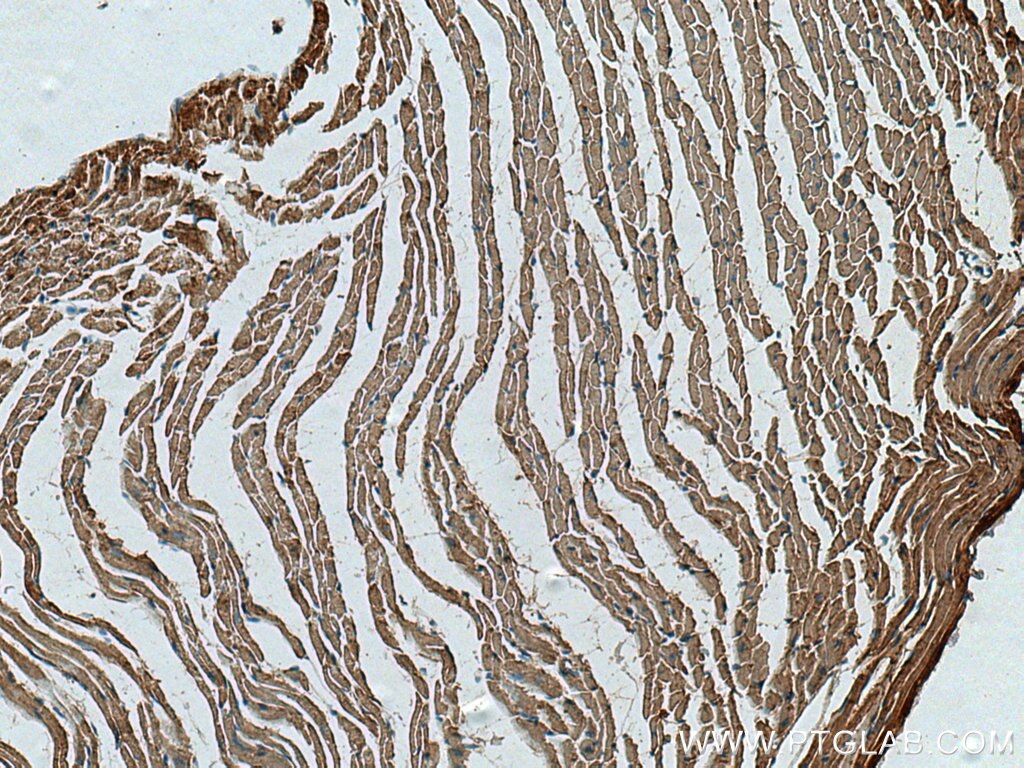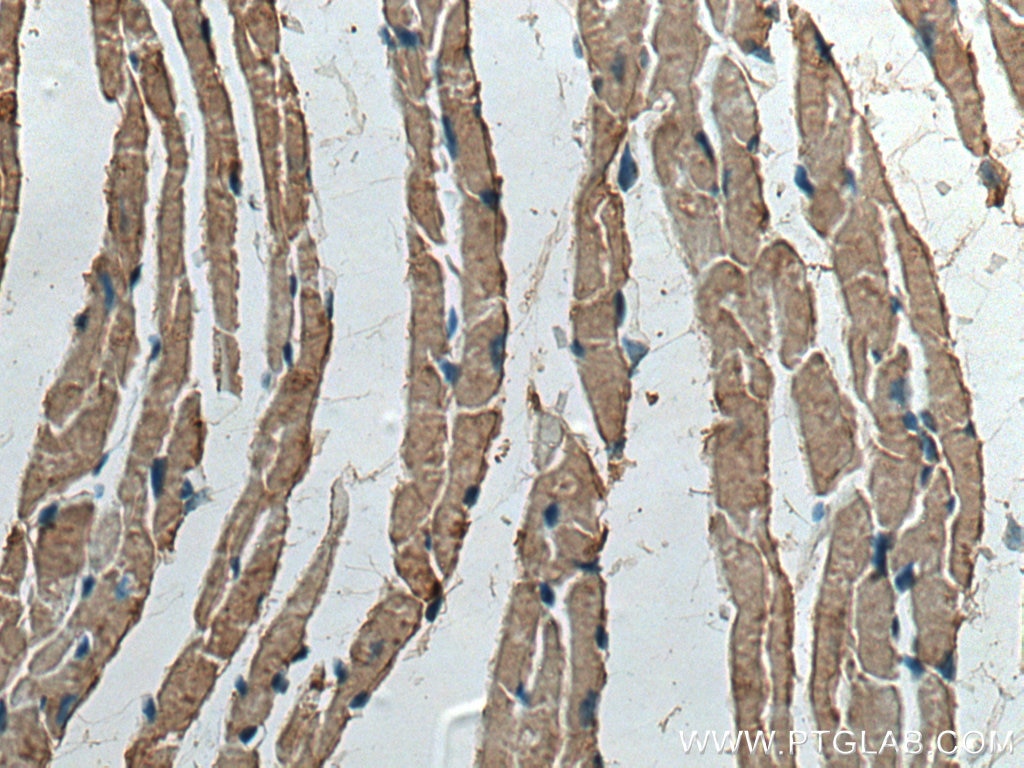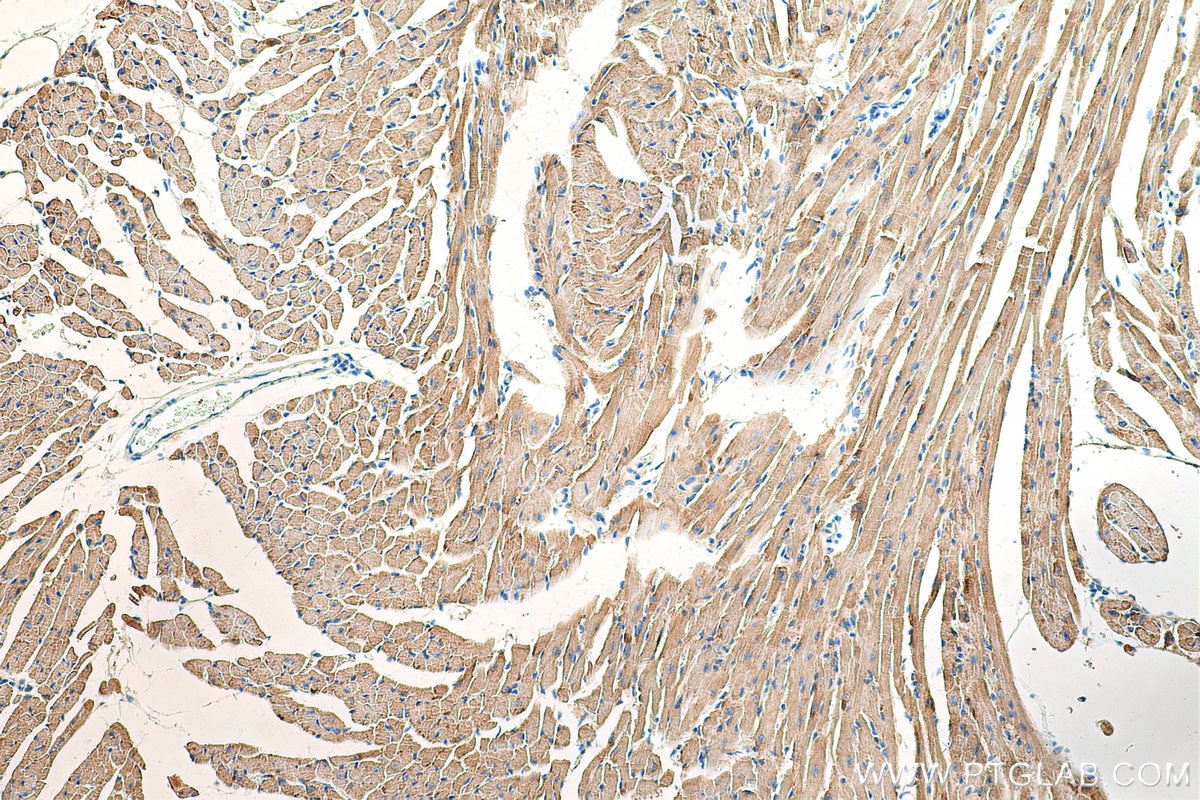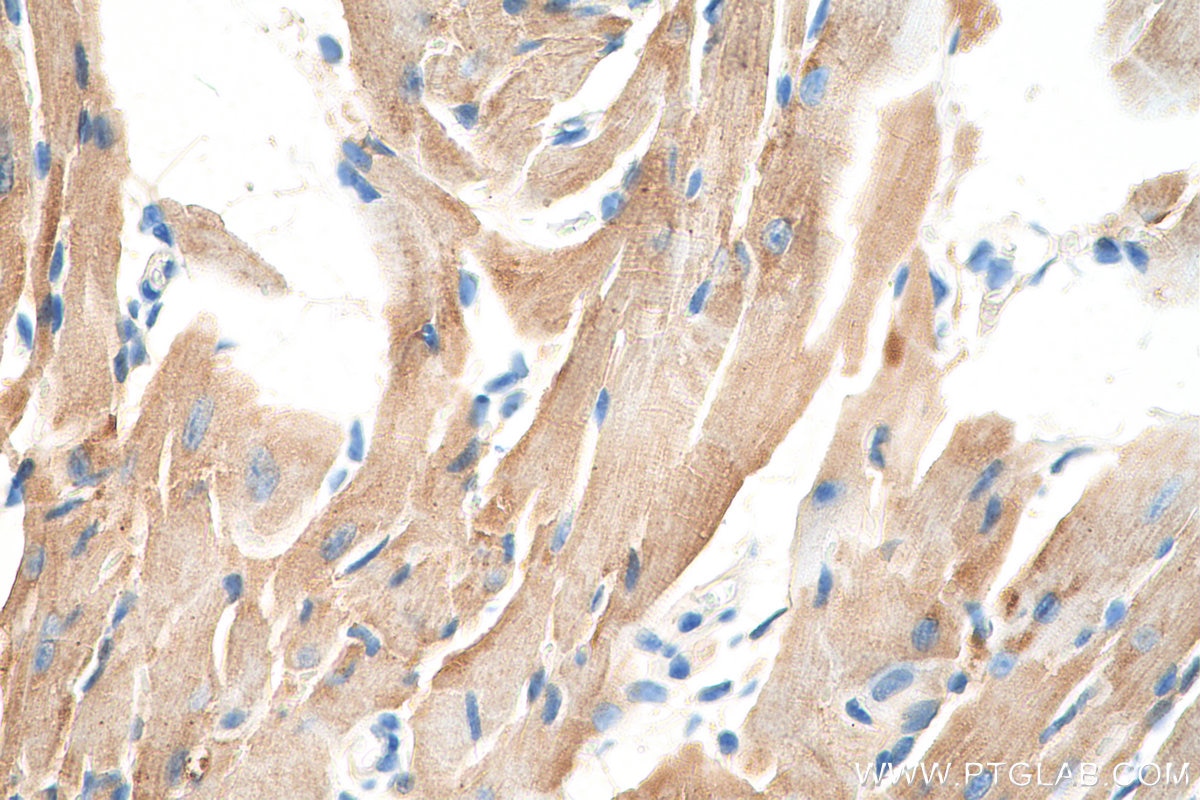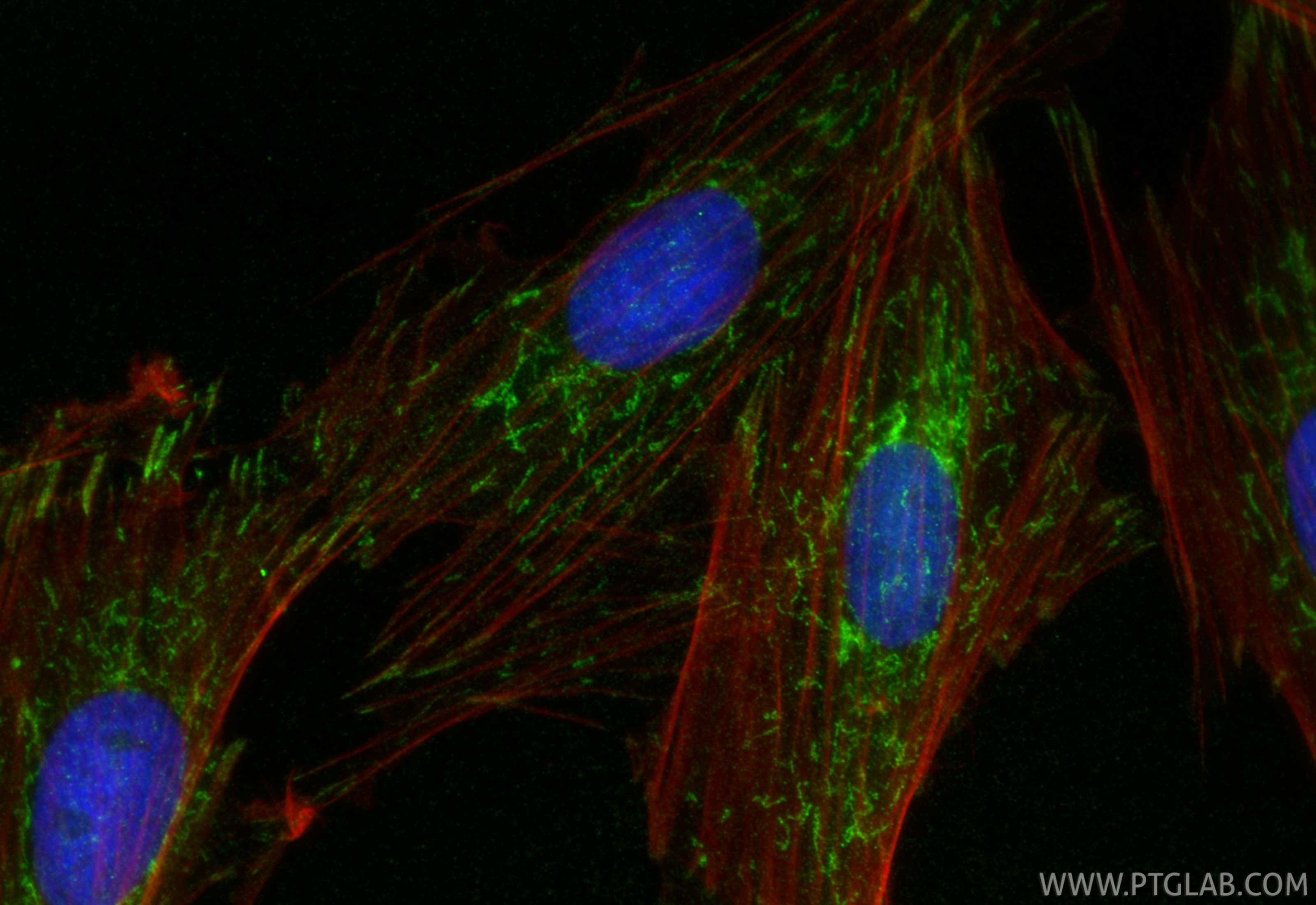Tested Applications
| Positive WB detected in | mouse heart tissue, human heart tissue, human skeletal muscle tissue, mouse skeletal muscle tissue |
| Positive IHC detected in | mouse heart tissue Note: suggested antigen retrieval with TE buffer pH 9.0; (*) Alternatively, antigen retrieval may be performed with citrate buffer pH 6.0 |
| Positive IF/ICC detected in | H9C2 cells |
Recommended dilution
| Application | Dilution |
|---|---|
| Western Blot (WB) | WB : 1:2000-1:8000 |
| Immunohistochemistry (IHC) | IHC : 1:500-1:2000 |
| Immunofluorescence (IF)/ICC | IF/ICC : 1:200-1:800 |
| It is recommended that this reagent should be titrated in each testing system to obtain optimal results. | |
| Sample-dependent, Check data in validation data gallery. | |
Published Applications
| KD/KO | See 1 publications below |
| WB | See 8 publications below |
| IHC | See 2 publications below |
| IF | See 1 publications below |
| CoIP | See 1 publications below |
Product Information
13207-1-AP targets CKMT2 in WB, IHC, IF/ICC, CoIP, ELISA applications and shows reactivity with human, mouse, rat samples.
| Tested Reactivity | human, mouse, rat |
| Cited Reactivity | human, mouse, chicken |
| Host / Isotype | Rabbit / IgG |
| Class | Polyclonal |
| Type | Antibody |
| Immunogen |
CatNo: Ag3971 Product name: Recombinant human CKMT2 protein Source: e coli.-derived, PGEX-4T Tag: GST Domain: 57-419 aa of BC029140 Sequence: LRKHNNCMAECLTPAIYAKLRNKVTPNGYTLDQCIQTGVDNPGHPFIKTVGMVAGDEESYEVFADLFDPVIKLRHNGYDPRVMKHTTDLDASKITQGQFDEHYVLSSRVRTGRSIRGLSLPPACTRAERREVENVAITALEGLKGDLAGRYYKLSEMTEQDQQRLIDDHFLFDKPVSPLLTCAGMARDWPDARGIWHNYDKTFLIWINEEDHTRVISMEKGGNMKRVFERFCRGLKEVERLIQERGWEFMWNERLGYILTCPSNLGTGLRAGVHVRIPKLSKDPRFSKILENLRLQKRGTGGVDTAAVADVYDISNIDRIGRSEVELVQIVIDGVNYLVDCEKKLERGQDIKVPPPLPQFGKK Predict reactive species |
| Full Name | creatine kinase, mitochondrial 2 (sarcomeric) |
| Calculated Molecular Weight | 419 aa, 48 kDa |
| Observed Molecular Weight | 41-48 kDa |
| GenBank Accession Number | BC029140 |
| Gene Symbol | CKMT2 |
| Gene ID (NCBI) | 1160 |
| RRID | AB_2081188 |
| Conjugate | Unconjugated |
| Form | Liquid |
| Purification Method | Antigen affinity purification |
| UNIPROT ID | P17540 |
| Storage Buffer | PBS with 0.02% sodium azide and 50% glycerol, pH 7.3. |
| Storage Conditions | Store at -20°C. Stable for one year after shipment. Aliquoting is unnecessary for -20oC storage. 20ul sizes contain 0.1% BSA. |
Background Information
CKMT2 (Creatine kinase S-type, mitochondrial), also known as s-MtCK, is one of the creatine kinase (CK) isozymes that are tightly coupled to adenosine triphosphate (ATP) output via adenine nucleotide transport proteins or carriers, making it an important player in ATP synthesis and respiratory chain activity (PMID: 38172162). Enhancing Ckmt2 expression or activity can protect against myocardial injury caused by ischemia-reperfusion injury (PMID: 39457679).
Protocols
| Product Specific Protocols | |
|---|---|
| IF protocol for CKMT2 antibody 13207-1-AP | Download protocol |
| IHC protocol for CKMT2 antibody 13207-1-AP | Download protocol |
| WB protocol for CKMT2 antibody 13207-1-AP | Download protocol |
| Standard Protocols | |
|---|---|
| Click here to view our Standard Protocols |
Publications
| Species | Application | Title |
|---|---|---|
Cell Metab The phytochemical hyperforin triggers thermogenesis in adipose tissue via a Dlat-AMPK signaling axis to curb obesity. | ||
Mol Cell Proteomics Seminal Plasma Proteome as an Indicator of Sperm Dysfunction and Low Sperm Motility in Chickens | ||
Metabolism Sustained mitochondrial biogenesis is essential to maintain caloric restriction-induced beige adipocytes. | ||
Front Cell Dev Biol Hypoxia-immune-related microenvironment prognostic signature for osteosarcoma | ||
Mol Cell Proteomics Seminal Plasma Proteome as an Indicator of Sperm Dysfunction and Low Sperm Motility in Chickens. | ||
J Agric Food Chem Artepillin C, a key component of Brazilian propolis, induces thermogenesis in inguinal white adipose tissue of mice through a creatine metabolism-related thermogenic pathway. |
Reviews
The reviews below have been submitted by verified Proteintech customers who received an incentive for providing their feedback.
FH Juhi (Verified Customer) (11-06-2025) | Works great!
|
FH Neeraj (Verified Customer) (08-19-2025) | This antibody performed very well in validating my Western blot analysis following transfection in cell lines. It demonstrated high specificity, especially when compared to a similar antibody from another supplier, which showed non-specific binding. I also used it for immunofluorescence experiments, and the results were satisfactory, with clear and consistent staining
|

